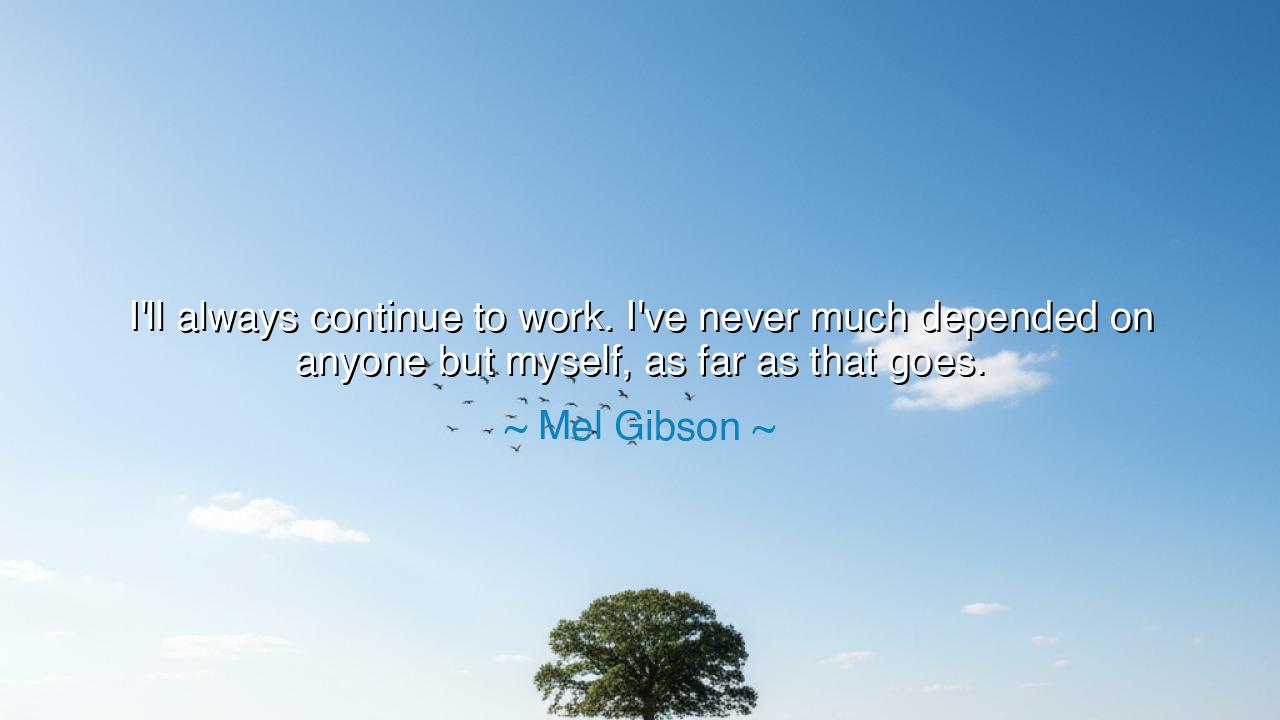
I'll always continue to work. I've never much depended on anyone
I'll always continue to work. I've never much depended on anyone but myself, as far as that goes.






Hear, O seekers of strength, the words of Mel Gibson, who declared: “I’ll always continue to work. I’ve never much depended on anyone but myself, as far as that goes.” In these words burns the spirit of self-reliance, the ancient fire that has carried humanity through storm and struggle. It is the voice of one who knows that fortune may fail, companions may falter, and circumstances may shift like sand—but the will within, when steadfast, can never be stolen.
The meaning of this saying lies in the power of endurance and independence. Gibson proclaims that his resolve to labor is not bound by comfort or by external aid, but by the inner command of his own heart. To depend upon oneself is not to reject the bonds of fellowship, but to stand firmly when others cannot uphold you. It is to say: I will walk forward, even if I must walk alone. Such a spirit is the bedrock of resilience, the mark of those who rise when others would remain fallen.
The origin of these words flows from Gibson’s own journey. Known across the world for his roles as actor and director, his career was not without hardship or trial. He faced both triumph and controversy, both acclaim and exile. Yet through all, his vow remained constant: to work, to create, to push forward regardless of who stood beside him. His words are less boast than creed, forged in the fires of a life where one must often rely upon the strength of one’s own hands.
History itself echoes this truth. Consider the figure of Benjamin Franklin, who rose from poverty in Boston with little but his own wit and diligence. Without patron or noble sponsor, Franklin taught himself, worked tirelessly, and became a printer, a writer, an inventor, and a statesman. He depended not on inherited wealth but on his own relentless drive. Or think of the Roman general Marius, who lifted himself from humble beginnings to reshape the armies of Rome, not through birthright, but through sheer work and unyielding will. Their legacies remind us that true greatness springs from self-reliance.
The lesson is luminous: one must cultivate the strength to move forward even when the world offers no hand. To depend on others for encouragement or reward alone is to build one’s house on sand. But to ground your life in discipline, in the certainty of your own resolve, is to anchor it upon rock. This is not to say that fellowship and aid are unworthy—no, they are gifts—but they cannot replace the inner command to endure.
Practical wisdom flows from this teaching. Whatever your calling, commit yourself to work with steadfastness. Do not delay because no one applauds you. Do not abandon your craft because support is lacking. Rise early, labor diligently, and let the fruits of your perseverance testify to your worth. Seek help when it is wise, but never let your destiny depend wholly upon another’s hand. For the world is uncertain, but the labor you command from yourself will always remain yours.
So let Mel Gibson’s words be etched upon your heart: rely upon yourself, and let your work never cease. For in every age, those who endure are not those who waited for rescue, but those who built their own path, even through wilderness. In this lies true freedom, and in this lies true power.
Thus, O children of tomorrow, carry this truth: treasure the bonds of fellowship, yes, but forge within yourself the strength to labor alone. For the one who can walk alone shall never be broken, and the one who never ceases to work shall never be defeated.






NTVi Ngoc Thanh
I admire Mel Gibson’s drive and personal commitment to always keep working. However, I also wonder if it’s possible to achieve great things without ever relying on anyone else. Do you think his approach might be harder to maintain as one’s career progresses? Could the pressures of constantly doing everything alone potentially lead to missed opportunities for growth and collaboration?
UNUyen nguuyen
Mel Gibson’s commitment to always working and depending on himself is admirable, but I can’t help but wonder, how does this mindset affect his personal life? Does being so independent make it difficult to form close relationships, or does he find strength in that? Can total self-reliance lead to a fulfilling life, or is it important to lean on others occasionally?
HNHien Nguyen
I really respect Mel Gibson’s attitude of self-sufficiency. It’s refreshing to hear someone embrace the value of hard work without relying on others. But do you think that’s sustainable in the long run? Is there a limit to how much one person can achieve alone, or do you think self-reliance can be the key to enduring success in an industry that often demands teamwork?
MDMy my Duong
Mel Gibson’s determination to rely on himself speaks volumes about independence and personal responsibility. It’s inspiring that he emphasizes his own self-reliance, but I wonder—does that ever lead to burnout or loneliness? Can someone truly achieve success without depending on others, or is there always a need for some form of collaboration and support, even if it’s just for moral backing?